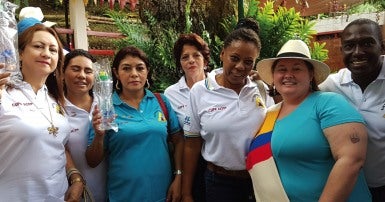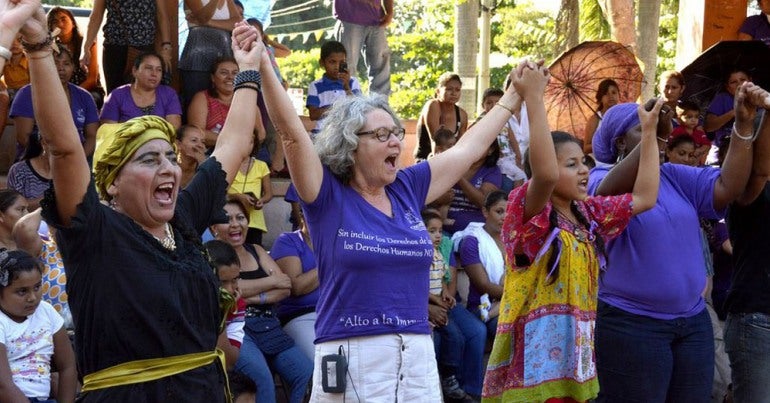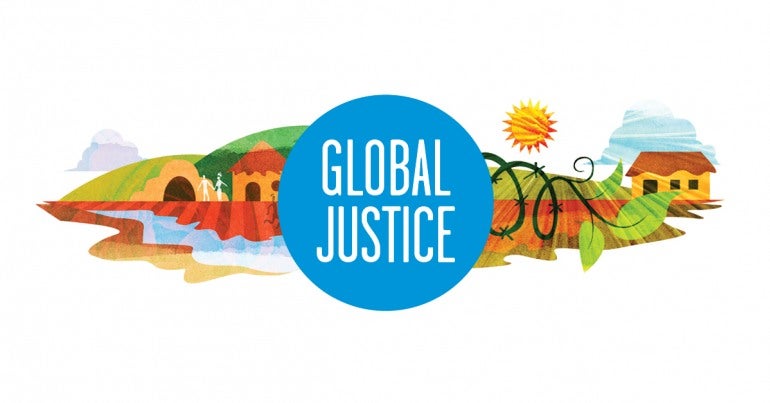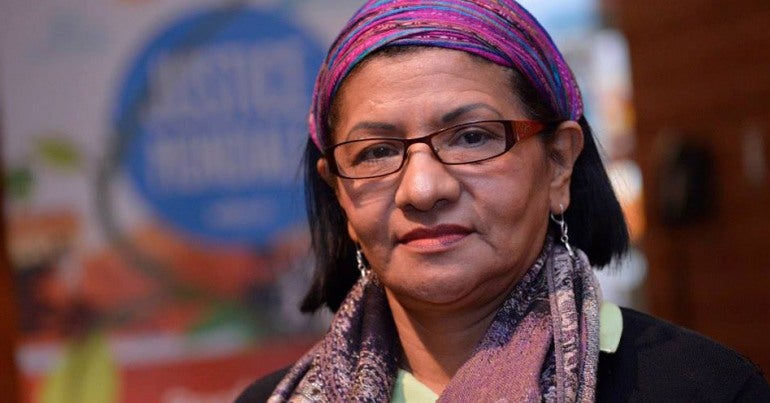 MIGRANT WORKERS
MIGRANT WORKERS
CUPE’s Global Justice Fund supports the KAIROS migrant justice project. KAIROS is an ecumenical movement for ecological justice and human rights. The focus of this project is to bring migrant workers, unions, community groups, churches, and service agencies together. Through dialogue and action their aim is to strengthen the rights and capacity of foreign migrant workers, to alleviate poverty and exploitive working conditions, as well as advocate for justice and equality between Canadians and foreign migrant worker communities.
Immigration policy in Canada is changing at a rapid pace. This project provides a platform for migrant workers to develop relationships of mutual support and solidarity. Over the past year, a series of migrant justice needs assessment and capacity building workshops, as well as migrant justice forums were held across the country. These initiatives brought together Indigenous peoples, diaspora communities, migrants and their advocates, in action towards transformative change on migrant justice issues.
Like other newcomers to Canada, foreign migrant workers often lack access to information and face challenges including language barriers, exploitation, and instances of abuse and gender violence. Migrant workers in the low-skilled streams are particularly vulnerable due to their temporary status, their dependence on a single employer tied to their work permits, and gaps in the enforcement of contracts and flaws in the rules and regulations of the Temporary Foreign Worker Program (TFWP).
Changes to the TFWP demonstrate the policy shift from an immigration model based on elevating permanent residency to a labour model that increasingly relies on migrant workers who will be permitted only temporary residence in Canada.
Under the current TFWP program, workers are separated from their families for extended periods of time, which contradicts Canadian values that emphasize strong families and family reunification. Because of their temporary immigration status, workers are also often subjected to abuse and exploitation, a fact that has been widely documented over the years and underscores the urgency to revise the program to ensure that workers’ rights are upheld, and their welfare protected.
In Canada, the health of temporary foreign workers is of vital importance, as they contribute to the growth and development of Canadian society. Stronger policies that establish full protection and rights for workers are needed to prevent abuse and exploitation, and to promote their wellbeing. The migrant justice project intends to support the alliances that are necessary to strengthen migrant workers’ power to realize these goals.
 HAITI
HAITI
Life is very difficult for most Haitian people. Organizing in the trade union movement is fraught with challenges that leaders and workers are trying to overcome. One of the biggest challenges is that the political and economic decisions of the country are deeply influenced by national and foreign governments, the corporate sector and international NGO actors that are proponents of privatized public services and open and unregulated markets.
CUPE participated in a trade union delegation to Haiti in July 2017 hosted by the Confédération des travailleurs et travailleuses des secteurs public et privé (CTSP). We met with workers and members from the energy, health, and education sectors. They shared their experience of mass jobs loss, privatization, and underfunding of public services. Underlying this difficult situation is trade union harassment and repression.
However, the labour movement is being revitalized through renewed organizing efforts, and the government and employers in the country are starting to take notice. Several labour leaders are being targeted and harassed by individuals some suspect may be private militia hired by employers. Leaders involved in the textile industry are calling for a higher minimum wage, in addition to food subsidies, enhanced public transport, and construction of social housing. These appeals are garnering international attention, and placing pressure on owners and employers to comply.
The CTSP is focused on the struggle of domestic workers in the country. The union is encouraging them to confront the struggles they face in the workplace, the union, and in society.
CUPE National last visited the CTSP in 2011 to support the reconstruction efforts of the union office following the devastating earthquake in 2010. The initiative was led by Public Services International (PSI), and supported by CUPE and PSAC. Following our recent visit, it is clear the office has become a hub of activity and is a central meeting point for workers in Port-au-Prince, and elsewhere in Haiti.
 COLOMBIA
COLOMBIA
The Colombian government signed peace agreements in the autumn of 2016, but troubles remain.
Armed paramilitary forces connected to large landowners and corporate economic interests are active throughout the country and have been linked to the murder of over 125 social movement activists since the signing of the accords. These abuses continue despite the disarmament of the FARC (a national liberation movement) and they are challenging people’s aspiration for genuine peace that ultimately addresses the social and economic roots of the armed conflict.
In other words, peace deals have been signed, but peace has not yet been achieved. That’s why CUPE and other Canadian unions continue their solidarity work with Colombian workers and Indigenous and African-Colombian communities through the Frontlines initiative.
For over 15 years, Frontlines has been organizing worker-to-worker solidarity exchanges with Colombian popular organizations that focus on supporting the peace process and exposing the negative impacts of Canadian investors and deregulated economic policies, including the Canada-Colombia Free Trade Agreement. The goal of all our delegations is to build mutual solidarity between public sector workers in Canada and Colombia in our mutual fight to stop the privatization of public services and to support the right of Indigenous communities to preserve and access their ancestral land.
In February 2018 Frontlines sent a Canadian labour delegation to Colombia that included CUPE, the Canadian Union of Postal Workers (CUPW), the Public Service Alliance of Canada (PSAC) and the Canadian Labour Congress (CLC). The delegation heard how Canadian resource extraction and military procurement agreements are threatening the livelihoods of farmers, Indigenous peoples and Afro-Colombians.
In the Port City of Buenaventura, delegates met with leaders from the civil strike committee, who shut down the largest port in the country for 22 days to demand basic public services. Many leaders we met clarified that they are not victims of the armed conflict, but of an unjust economic development model. Communities continue to resist displacement as multinational corporations move onto their land or demand port and highway expansions to facilitate the movement of goods.
The delegation came away with a deeper understanding of how privatization, land grabs and massive dislocation of the rural population continue to be commonplace. The delegation also learned how communities and unions that resist are being criminalized and silenced, either through legislation, the justice system and/or paramilitary violence.
CUPE, along with its Canadian partner unions, continues to work to shed light on the situation in Colombia. Leaders in Colombia need our support and solidarity now more than ever.
IRAN
In more than a decade of activism, union members of the Syndicate of Workers of Tehran and Suburbs Bus Company have overcome many difficulties and incurred heavy costs for their commitment to the trade union, including intimidation, persecution and imprisonment. Nevertheless, the union has continued to be active in protecting the rights and interests of workers at the Vahed Company. Accordingly, the Vahed Syndicate and its members have become the target of state aggression and have received heavy prison sentences intended to stop their progress in protecting workers’ rights.
Reza Shahabi, a board member of the bus workers’ syndicate, was released from prison in March 2018 after being imprisoned for trade union activities since June 2010. In the months leading to his release, the union participated in three large demonstrations with allied workers’ organizations, teachers, students and women.
The privatization of the Vahed Company and the anti-worker amendments to the existing labour law, and the delayed housing project for Vahed workers are priority campaigns for the union. The union coordinated a series of actions against cut backs and non-payment of benefits to bus workers that included a day of action by all bus drivers.
Workers and the poor in Iran urgently need international solidarity to help strengthen workers’ and social justice movements, and stave off interference by the US administration and its allies.
PHILIPPINES
Since Rodrigo Duterte assumed the post as President of the Republic of the Philippines in 2016, the Alliance of Concerned Teachers (ACT) has been actively pushing for meaningful reforms for the education sector and Philippine society in general.
ACT welcomed President Duterte’s initial pronouncement against the use of contract labour, and the promise of doubling the basic pay of public school teachers, genuine land reform, and industrialization of the countryside. These are all issues close to ACT’s heart.
However once elected, President Duterte abandoned his promises. In turn, ACT has launched campaigns to advance the interests of the students, teachers, non-teaching personnel and the public. Opposition to contract labour and the privatization of education, and the call for a just and living wage continues.
A campaign launched by the Save Our Schools Network in solidarity with the Indigenous Lumad communities in Mindanao has the active support of ACT. They have mobilized their chapters and networks to help advance efforts to stop the militarization of Lumad schools and communities.
Through its ACT for Peace campaign, ACT broadly called for the resumption of peace talks between the Government of the Republic of the Philippines (GRP) and the National Democratic Front of the Philippines (NDFP). In November 2017, President Duterte arbitrarily cancelled the talks.
With the cancellation of the peace negotiations, the ongoing human rights violations worsened. President Duterte issued his so-called “terrorist list” at the beginning of 2018. It included several human rights defenders and activists, including ACT’s Regional Coordinator Jeanette Ribaya-Cawiding. In the current context, it is understood that the list will be used by the government to go after its political dissenters and those who oppose government policy.
HONDURAS
Recent elections in Honduras have led tens of thousands of people, including CUPE’s partner organization Honduran Women’s Collective (CODEMUH), to the streets in protest. They are demanding the immediate resignation of Juan Orlando Hernández following elections that denied the opposition candidate Salvador Nasralla the presidency. The Organization of American States (OAS) concluded that the November 26, 2017 elections were fraudulent and required new elections.
Despite the obvious fraud, the will of the people, and the subsequent violence perpetrated by the state, the Canadian government recognized the Hernández government as legitimate. Eighty-five Canadian academics sent the Trudeau government a joint letter on January 22. It stated: “The fraudulent and repressive re-election of Juan Orlando Hernández must not be legitimized by Canada’s presence at his inauguration. Nor should Canada continue to provide any form of assistance to his discredited regime.”
Canada has much to gain from these right-wing governments who undemocratically lead the country, including the expansion of corporate and investor rights in the areas of mining, garment sweatshop industry, hydro-electric dams and tourism.
CODEMUH is clear that they are in a dangerous situation, and that the country is in the worst condition in its history. They continue to organize in their workplaces and in the streets.







